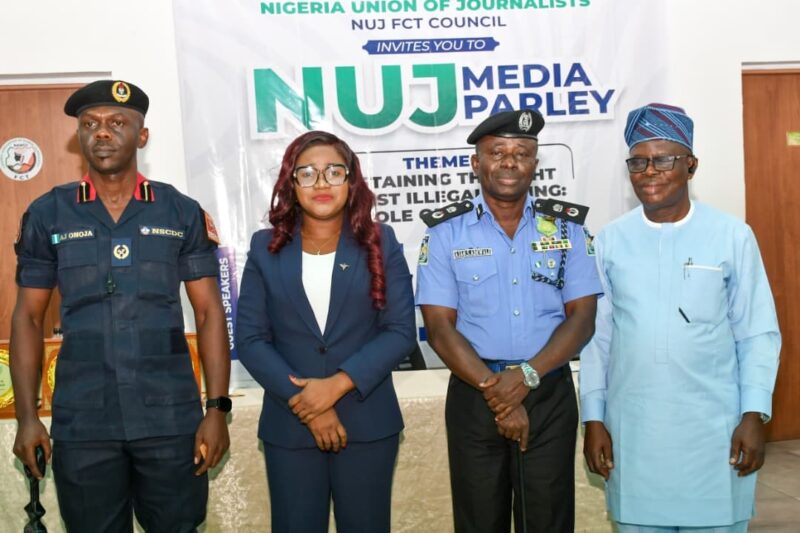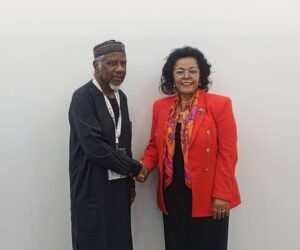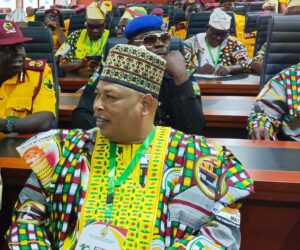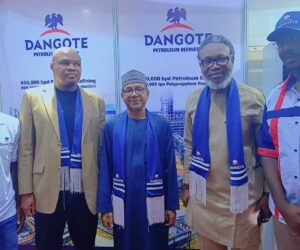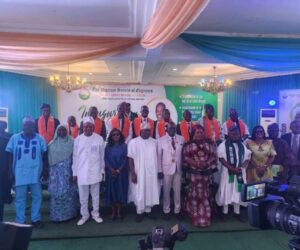1 total views today
By Naomi Sharang
Mr Attah Onoja, Commander of the Nigerian Security and Civil Defence Corps (NSCDC) Mining Marshals, says revenue from the mining sector rose from N6 billion to over N38 billion within one year of the unit’s establishment.
Onoja said the Mining Marshals, set up to curb illegal mining, had made steady progress in sanitising the sector.
He disclosed this at a media parley and workshop organised by the Nigeria Union of Journalists (NUJ), FCT Council, on Wednesday in Abuja.
The workshop was themed “The Fight Against Illegal Mining: Role of the Media”.
He said the efforts of the mining marshals in addressing illegal mining activities across the country have led to a significant increase in revenues accruing from the mining sector.
Onoja, while urging the media to join in the fight against illegal mining, cautioned against biased or compromised reportage.
He added that illegal mining cartels were sponsoring what he called “rogue journalism” to discredit enforcement efforts.
“We will not cave to any blackmail designed to weaken our resolve. Illegal mining cannot be defeated by enforcement agencies alone, and this is why we are calling on the media to be partners in this fight,” Onoja said.
He said that the marshals, an enforcement arm of the NSCDC had dismantled illegal camps, prosecuted offenders, and restored order in volatile mining corridors since their creation under the Tinubu administration.
While admitting challenges such as entrenched interests and inadequate logistics, Onoja insisted the campaign was crucial to national survival.
“Our message is clear: Nigeria’s mineral wealth belongs to all Nigerians, not to be plundered by a few,” he said.
The Commissioner of Police, FCT, Mr Ajao Adewale, revealed that illegal mining has become a powerful cartel-driven enterprise bankrolled by influential Nigerians.
“This is fueling banditry and costing the country an estimated $9 billion (N13.7 trillion) annually.
Adewale described illegal mining as one of Nigeria’s most dangerous national security threats.
“The Nigeria Extractive Industries Transparency Initiative (NEITI) cited that Nigeria loses up to 9 billion dollars (N13.7 Trillion Naira) annually to illegal mining/gold smuggling in Nigeria.
“Illegal mining is not just a mere economic crime; it fuels insecurity, degrades our environment, undermines lawful investment, and robs our nation of vital resources.”
He listed Zamfara, Nasarawa, Kogi, Kaduna, Niger, Kwara, Osun and parts of the FCT as hotspots of illegal mining.
Adewale noted that over 72 suspects had been arrested in Abuja alone between 2023 and 2024 for illegal mining activities.
He stressed that without collaboration between security agencies and the media, the cartels would continue to thrive.
On his part, National President of the Miners Association of Nigeria, Mr Dele Ayanleke, warned that illegal mining was sustained by corruption, poverty and weak governance.
“From child labour in Nasarawa’s lithium fields to mercury poisoning in Zamfara’s gold sites, the costs are severe,” Ayanleke said.
“Illegal mining undermines legitimate investors, destroys communities, and fuels insecurity. Only sustained attention, especially from the media can help dismantle these cartels.”
On her part, the Chairman of NUJ FCT Council, Grace Ike, urged journalists to take the fight beyond ordinary reportage by conducting investigative journalism that exposes financiers, amplifies community voices and pressures policymakers.
“As gatekeepers of truth, we must investigate, expose, and educate the public on the devastating effects of illegal mining,” she said.
Ike assured that the NUJ would continue to champion, amplify the voices of affected communities, ensuring that their stories and struggles are heard nationwide.(NAN)
Edited by Yakubu Uba
Published By
- Agriculture and Environment Desk Controller/Website Content Manager.

